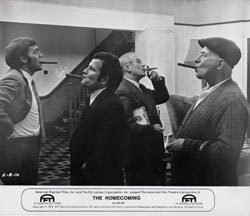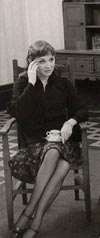

|
|
Films by Harold
Pinter
|
||||
| The Homecoming 1969 | ||||
|
Directed by Peter Hall Starring: Ian Holm, Cyril Cusack, Michael Jayston, Vivien Merchant, Terence Rigby Screenplay not published, original play by Harold Pinter |
||||
The Homecoming is Pinter's most tumultuous full-length play as menacing as The Birthday Party, as mysterious as Old Times but so full of wild essential life that questions about its meaning seem secondary if not superfluous. One need not define life when one can point to it, which is what Pinter is doing in The Homecoming, with marvellous control of exaggerated language and gesture that have the effect of a fluoroscope. Pinter keeps giving us glimpses of interior furies that most of us prefer not to acknowledge in the daytime. For some peculiar reason these glimpses are often hilariously funny. It may be that we laugh at the outrageous behaviour of the Cockney family in The Homecoming for the same reason that we laugh that the terrible things that happen to characters in slapstick comedy, because it's happening to them and not to us. The film, as far as I can tell from a reading of this stage test, is a practically untouched adaptation of the play though Hall's camera never seems to intrude on the life of the play. It never embarrasses the actors by exposing them to be what they are. Most of the action continues to take place in the barren parlor of the North London house ruled by foul-mouthed old Max (Paul Rodgers), the patriarch of a clan now reduced to three, his sons Lenny (Ian Holm), and Joey (Terence Rigby) and his younger brother Sam (Cyril Cusack) a chauffeur for a private firm. Vincent Canby, New York Times, November 13, 1973
Pinter's mischievous gift is to render everything doubtful. Does Teddy really teach in America? Do he and his wife really have three sons; have they honestly been in Venice on holiday? And if any of all of the above is true, why do they arriveunannounced in the middle of the night after nine years of silence, to see a father who has not been told of the marriage of the grandchildren in a house seething with frustration? "You never heard such silences, " says a character in The Homecoming " and it is true. The pauses are pregnant with doubt, fear, triumph, pain, retreat and nasty calculation. The words they employ are either banalities or the acid-tipped darts of family warfare. Each man seems unable to keep his own identity without shredding the egos of all the others in the house. Pinter the entertainer makes the cross talk frequently as funny as a vaudeville skit, except that the beautifully timed chatter is always frosted with overtones- a need to defend, a need to wound. The homecoming shakes up the peckish order and sets off a new scramble for places. Sam and Max, with some of their comforting old lies apparently unmasked, have at the end both wheezed through not quite fatal heart seizures. And the men having been tyrannized for years by a woman, seem to have invited a new tyranny. The homecomer leaves again, but whether it is a humiliation or an escape is, like everything else, uncertain. Within his absurd, almost ritual-like dramas, Pinter suggests the real-enough lacerations we lay on each other, the failures we conceal in the past, the unspoken deeds we go in fear of, the speech we employ to conceal our thoughts and feelings. The Homecoming is by any interpretation a scintillating piece of work.
|
||||

